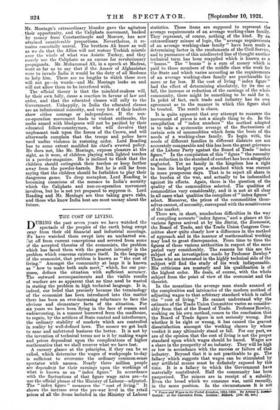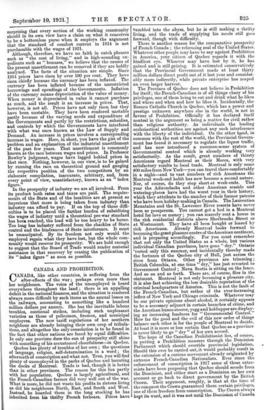THE COST OF LIVING. D 1JRING the past seven years we
have watched the spectacle of the peoples of the earth being swept may from their old financial and industrial moorings. We have watched them swept into an uncharted sea. Out off from current conceptions and severed from some of the accepted theories of the economists, the problem which has faced them with the greatest intensity is the problem which concerns existence itself. In the language of the economist, that problem is known as " the cost of living." Amongst the community at large it is known as " how to make both ends meet," which, for our pur- poses, defines the situation with sufficient accuracy. The outward accompaniments and the visible results of warfare are so apparent that no time need be wasted in stating the problem in high technical language. It is, indeed, our belief that precisely because the terminology of the economist has been introduced into this matter there has been an ever-increasing reluctance to face the obvious and elementary facts of the situation. For six years we have been flying in the face of reason and endeavouring, in a manner borrowed from the madhouse, to regain, by the artifices of State control and interference, the ordinary stability of markets which are controlled in reality by well-defined laws. The sooner we get back to sane and unfettered business the better. It is not by the invention of technical terms nor is it by making wages and prices dependent upon the complications of higher mathematics that we shall recover what we have lost.
A cursory glance at the principles, if they can be so called, which determine the wages of workpeople to-day is sufficient to overcome the ordinary common-sense spectator with nausea. Nearly three million people are dependent for their earnings upon the workings of what is known as an " index figure." In accordance with the fluctuations of that figure wage rates are—to use the official phrase of the Ministry of Labour—adjusted. The " index figure " measures the " cost of living." It shows the increase over the pre-war level in the retail prices of all the items included in the Ministry of Labour statistics. Those items are supposed to represent the average requirements of an average working-class family. They represent, of course, nothing of the kind. By an extraordinary misuse of logic, the "average requirements of an average working-class family " have been made a determining factor in the emoluments of the Civil Service, and in pursuance of this misdirected line of thought another technical term has been reapplied which is known as a " bonus." The " bonus " is a sum of money which is paid to those members of the middle class who work for the State and which varies according as the requirements of an average working-class family are purchasable for more or for less. If the cost of living purchasable index figure " had the effect of determining absolutely, by its rise or fall, the increase or reduction of the earnings of the whole community, there might be something to be said for it. In point of fact, each trade and industry has its own agreement as to the manner in which this figure shall be treated. The result is chaos.
It is quite apparent that any attempt to measure the movement of prices is not a simple thing to do. In the compilation of " index numbers ' the method adopted is to take a systematic average of the fluctuations of certain sets of commodities which form the basis of the needs of a working-class family. To begin with, the needs of different families in different districts are not accurately comparable and this has been the great grievance of the Labour Party against the Board of Trade index figure." In the compilation of this " figure " the necessity of a reduction in the standard of comfort has been altogether neglected. Yet no family in the kingdom has a right to base its budget upon a standard which was current in more prosperous days. That is to reject all share in the burden of the war, and actually to be indemnified against its effects. Again, there is the question of the quality of the commodities selected. The qualities of commodities vary considerably, and it is not at all clear in all cases what qualities the compilers of " index figures " select. Moreover, the prices of the commodities them- selves cannot, of necessity, correspond with the sensitiveness of the market.
There are, in short, numberless difficulties in the way of compiling accurate " index figures," and a glance at the various figures arrived at by the Statist, the Economist, the Board of Trade, and the Trade Union Congress Com- mittee show quite clearly how a difference in the method of approach and in the manner of mathematical working may lead to great discrepancies. From time to time the figures of these various authorities in respect of the same period vary considerably. The reasons for this are the subject of an investigation made by Professor Bowley.* Those who are interested in the highly technical side of the subject will find the study of his work indispensable. His criticisms are masterly and his qualifioation is of the highest order. He deals, of course, with the whole subject from the point of view of the economist and the theorist.
In the meantime the average man stands amazed at the complexities and intricacies of the modern method of adjusting wages to that arbitrary standard which is called the " cost of living." He cannot understand why the estimate of the Trade Union Committee varies so consider- ably from that of the Board of Trade. Professor Bowley, working on his own method, comes to the conclusion that the Board of Trade figure is not seriously wrong. But whether it be right or wrong, it has caused the gravest dissatisfaction amongst the working classes by whose verdict it may .ultimately stand or fall. For our part, we are of the opinion that the cost of living is not the proper standard upon which wages should be based. Wages are a share in the prosperity of an industry. They will be high or low in accordance with the success or failure of that industry. Beyond that it is not practicable to go. The fallacy which suggests that wages can be stimulated by any artificial means must be definitely, exposed by this time. It is a fallacy to which the Government have materially contributed. Half the community has been pauperized. The miners are in receipt of a subsidy. Even the bread which we consume was, until recently, in the same position. In the circumstances it is not • Priem and Wages in the United Kingdom, 1914-1420. By Arthur L Boiler Oxford at the Clarendon Press. London LiOe. 60. net.] surprising that every section of the working community should in its own view have a claim on what it conceives to be a bottomless purse when it employs the argument that the standard of comfort current in 1914 is not purchasable with the wages of 1921. Although, therefore, we have no faith in catch phrases such as the cost of living," and in high-sounding ex- pedients such as " bonuses, we believe that the causes of the present unsettlement can be removed if they are boldly analysed. The facts of the situation are simple. Since 1914 prices have risen by over 100 per cent. They have risen chiefly because the currency has been inflated. The currency has been inflated because of the unrestricted borrowings and spendings of the Governments. Inflation of the currency means depreciation of the value of money. When money is depreciated in value it cannot purchase as much, and the result is an increase in prices. That, however, is not all. Prices have not only risen but they have been unstable. They have been rendered unstable partly because of the varying needs and expenditure of the Governments and partly by the restrictions, subsidies, and controls by which the Governments have interfered with what was once known as the Law of Supply and Demand. An increase in prices involves a corresponding increase in wages. Here, in short, you have the gist of the problem and an explanation of the industrial unsettlement of the past few years. That unsettlement is commonly known as the race between wages and prices. In Professor Bowley's judgment, wages have lagged behind prices in that race. Nothing, however, in our view, is to be gained by running the race on theoretical ground and gauging the respective position of the two competitors by an elaborate compilation, inaccurate, arbitrary, and, from every point of view, unsatisfactory, known as an " index figure."
In the prosperity of industry we are all involved. From its product both rates and taxes are paid. The require- ments of the State and of the localities are at present so imperious that more is being taken from industry than industry can afford to pay. If on the top of these diffi- culties is to be placed the further burden of subsidizing the wages of industry until a theoretical pre-war standard has been reached, the load will be too heavy to be borne. Too long has industry suffered from the shackles of State control and the hindrances of State interference. It must be emancipated. By its freedoni not only would the employed regain what they have lost, but the whole com- munity would recover its prosperity. We are bold enough to suggest that the Board of Trade would render material assistanoe in that recovery by ceasing the publication of its " index figure " as soon as possible.



































 Previous page
Previous page